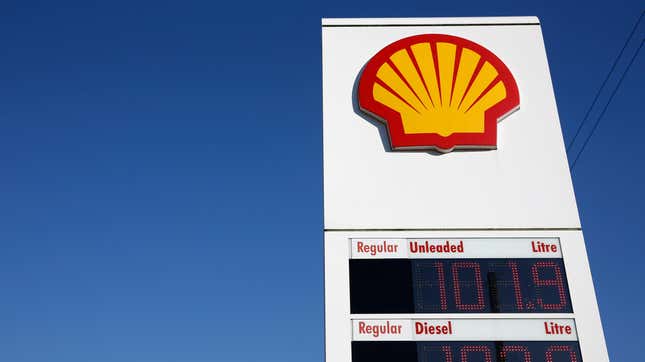
In the Netherlands, officials ruled that Shell has to halt ads that claim customers can render their fuel purchases “carbon neutral” by paying for carbon offsets. The reasoning is pretty straightforward: Shell has, uh, no proof that their claims were true.
The decision isn’t legally binding, but it’s still a good sign. Shell has two weeks to appeal the decision. After that, the court will publish a final decision, which could force Shell to pull the ads.
The Netherlands’ courts have really been kicking Shell’s ass of late. Earlier this summer, a Dutch court issued a massive ruling ordering the oil company to slash its carbon pollution 45% by 2030. The company also now joins BP and Chevron in getting hauled to court for greenwashing.
The new ruling, handed down last week by the Dutch Advertising Code Committee (a national marketing and advertising watchdog), came in response to a complaint filed in April by nine legal students at Vrije University’s Climate Change and Sustainability Law Clinic in Amsterdam. The students’ complaint was backed by the Reclame Fossielvrij (Fossil-Free Advertising) campaign and Greenpeace Netherlands.
The 95-page filing specifically calls out a Shell ad campaign in which the company tells its customers that if they pay an extra cent per liter of fuel, the money will go to forest conservation and tree planting projects meant to cancel out the carbon pollution associated with the fuel. (You can see the ads here.) The nine students dug into the carbon credits on offer and found they were sketchy at best.
“For example, one form of carbon compensation that the company offers is a pledge to protect forests in Peru from logging. Our research shows that this forest was not actually being logged in the years before Shell started protecting it,” one of the students, Lisa van Langen, said in a statement. “Also, forests are absorbing increasingly less carbon, and the forest could burn down. Shell wants to compensate climate damage that is 100% definite with a measure that they cannot know for sure will work, or for how long it will work.”
The findings fit with a growing body of research showing the math behind carbon offsets is dicey. Forests meant to sequester carbon in the western U.S. have gone up in flames this summer and there are myriad discrepancies with how the programs calculate carbon sequestered that may lead to more carbon emissions. (They also raise a slew of human rights issues, too.) In court, Shell countered by saying they did research to back up their claims. A company spokesperson told Bloomberg that Shell will “study the ruling in detail and consider any necessary changes to communications.”
The students and their supporters are thinking bigger than this one case and are calling for a complete ban on fossil fuel advertising. It seems if that kind of policy will be implemented anywhere, it will be the Netherlands. Six political parties have professed their support for such a ban. Late last year, the city of Amsterdam also moved to outlaw all fossil fuel advertisements. This past May, Amsterdam passed a ban on fossil fuel ads in its metro stations. And the nation also has a history of imposing such restrictions on evil industries: For decades, the Netherlands has had a ban on tobacco advertising.
Of course, going after Big Oil’s advertising won’t by itself end the fossil fuel economy, but research shows that the industry has long used ads and other marketing strategies to maintain its social license. Ending polluting corporations’ ability to make false claims—or better yet, advertise at all—could certainly play a role in clean energy transition.